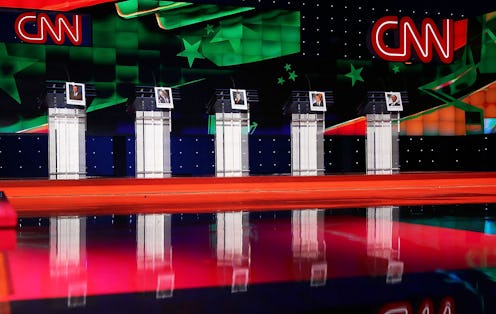News
A Possible Plot Twist In The General Debates
The first general election debate scheduled by the Commission on Presidential Debates is more than three months away, as it's not taking place until Sept. 26. But those eager to see Donald Trump and Hillary Clinton face one another at long last should prepare themselves for a potential curve ball: There could be a third podium on the stage, as the first general election debate might feature a third-party candidate.
Gary Johnson, the Libertarian Party candidate, is showing promising numbers in early polls; if they rise slightly, he could end up qualifying for the debates. In order to qualify, the Commission requires that a candidate is polling at 15 percent or more in at least five national polls leading up to each debate. Which polls they rely on will be determined closer to each debate.
In some polls, Johnson is just barely hitting double digits. Real Clear Politics shows Johnson averaging 9 percent in eight polls from May 31 to date; but in three of them, he earned 11 to 12 percent. This early in the game, it's possible for him to pick up steam ahead of the debates, a prospect made more likely by widespread dissatisfaction with the Republican Party's nominee. Some Republican voters might find refuge in the Libertarian Party's fiscally conservative, socially liberal party line.
It should be noted, however, that Johnson is not performing as well in polls featuring a four-way contest including presumptive Green Party nominee Jill Stein. In that scenario, Johnson is polling at an average 6 percent, with Stein averaging 3.4 (at time of writing). Whether the Commission selects polls with or without Stein might be a determining factor in whether Johnson qualifies for debates. Then again, with supporters of Sen. Bernie Sanders coming to terms with his loss of the nomination and some seeking an alternative, Stein herself could see a considerable boost in her numbers. The Green Party won't officially decide its nominee until Aug. 4.
A non-major-party candidate hasn't made it to the general election debate stage since independent candidate Ross Perot in 1992, The Hill reported. At this early point, Johnson appears to have a real shot, though this could be tempered and even overcome by a Stein bump between June and September.
Either way, the... unique... flavor of the 2016 election has primed the presidential race to be kinder terrain for third-party candidates. However, they still face tremendous obstacles regarding media coverage, campaign financing, and fears among the electorate of the "spoiler effect," all of which could keep their percentage of the popular vote in November relatively low.
Although we can't expect a third-party win in the general election, the presence of one or both candidates on the debate stage alongside Clinton and Trump would be a testament to widespread frustration with the major parties. And it could strengthen the third parties in the long run; if one of them ends up with at least 5 percent of the popular vote — something made much more likely by the exposure garnered from a debate — they would qualify for government campaign funding in the next election.
A final important point to note is that the presence of third-party candidates on the debate stage could influence the major-party candidates' campaigns. If Trump has to compete not only against Clinton but against Johnson, it might sway him to adopt saner, firmer positions on issues of interest to right-leaning voters. And if Stein gets a coveted podium, she could continue the leftward pull on Clinton's positions that Sanders effected throughout the primaries.
Don't expect to see a third-party president in 2017. But don't be surprised if you see one of these candidates on the debate stage.
